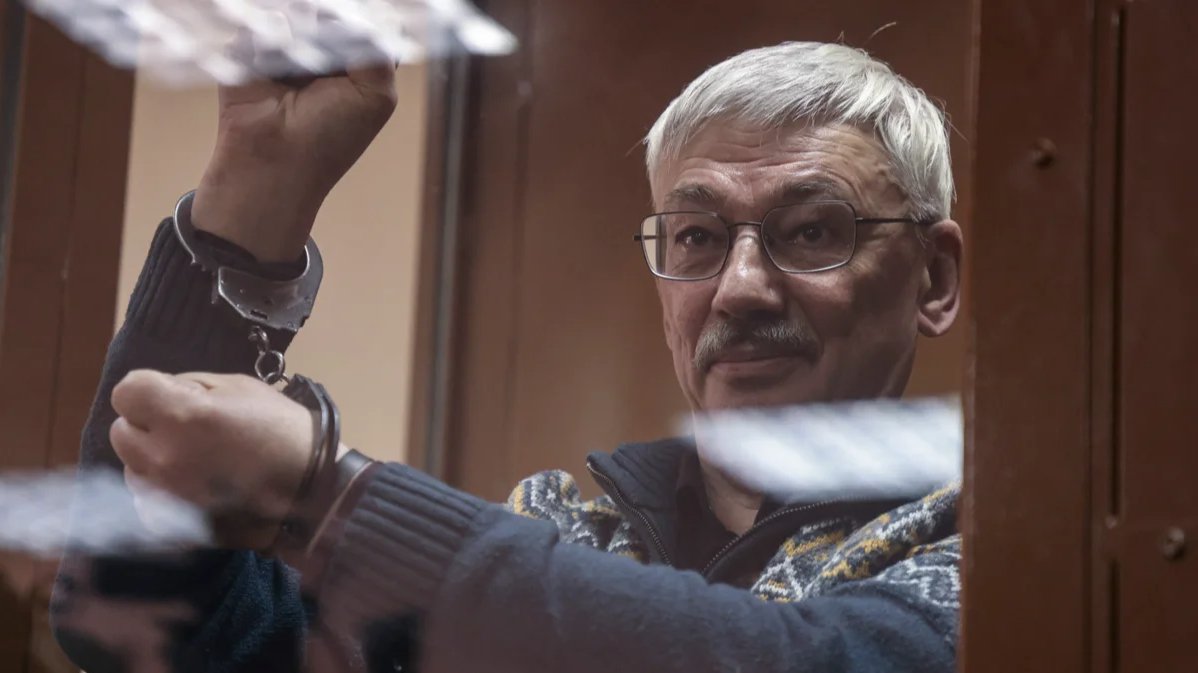The co-chairman of the Nobel Prize-winning human rights organisation Memorial, Oleg Orlov, is being held hostage by the Russian justice system as he appeals his recent sentence of 2.5 years behind bars for anti-war comments.
Orlov, who recently turned 71, is currently being transferred to a prison colony despite the fact that appeal has yet to be heard, Memorial wrote on Monday, adding that Orlov got in touch with them from a pretrial detention centre in Samara, which is unlikely to be his final destination.
Transferring prisoners to a prison colony before they have exhausted their legal right to appeal is against the law, lawyer Katerina Tertukhina said, yet it is a reality for many prisoners in Russia.
Prisoners are transported in conditions of near “torture” in special wagons packed to the gills with people, Memorial added. “Due to the cramped conditions, prisoners have to take turns sleeping. It is forbidden to use the toilet during long stops. There is no opportunity to eat properly on the train, and there is often a lack of water, fresh air and light.”
Memorial voiced concerns over Orlov’s health, which it said had deteriorated significantly during his recent spell in a Moscow pretrial detention centre where he was repeatedly denied hot food and rest.
How did someone of Oleg Orlov’s international repute become just another victim of Vladimir Putin’s gruesomely cruel regime and what is likely to happen to him next?
Mitigating disaster
Although the Memorial human rights group was dismantled by the Kremlin just months before the Russian invasion of Ukraine, Oleg Orlov has chosen to remain in Russia and continued to criticise the government despite an increasingly repressive political climate.
Orlov was first fined in March 2022, just a month after the full-scale invasion of Ukraine, for a poster that read: “A crazed Putin is pushing the world towards nuclear war!”
Two weeks later, Orlov was detained on Red Square for protesting with a sign that said “Our silence and unwillingness to know the truth turn us into accomplices” and was fined again for “discrediting the Russian army”, one of the censorship laws introduced to Russia soon after the invasion.
Under the new law, repeat offences of “discreditation” can lead to criminal charges, which were eventually filed against Orlov after he posted on his Facebook page an article he’d written for the French online newspaper Mediapart entitled “They wanted fascism. They got it”.
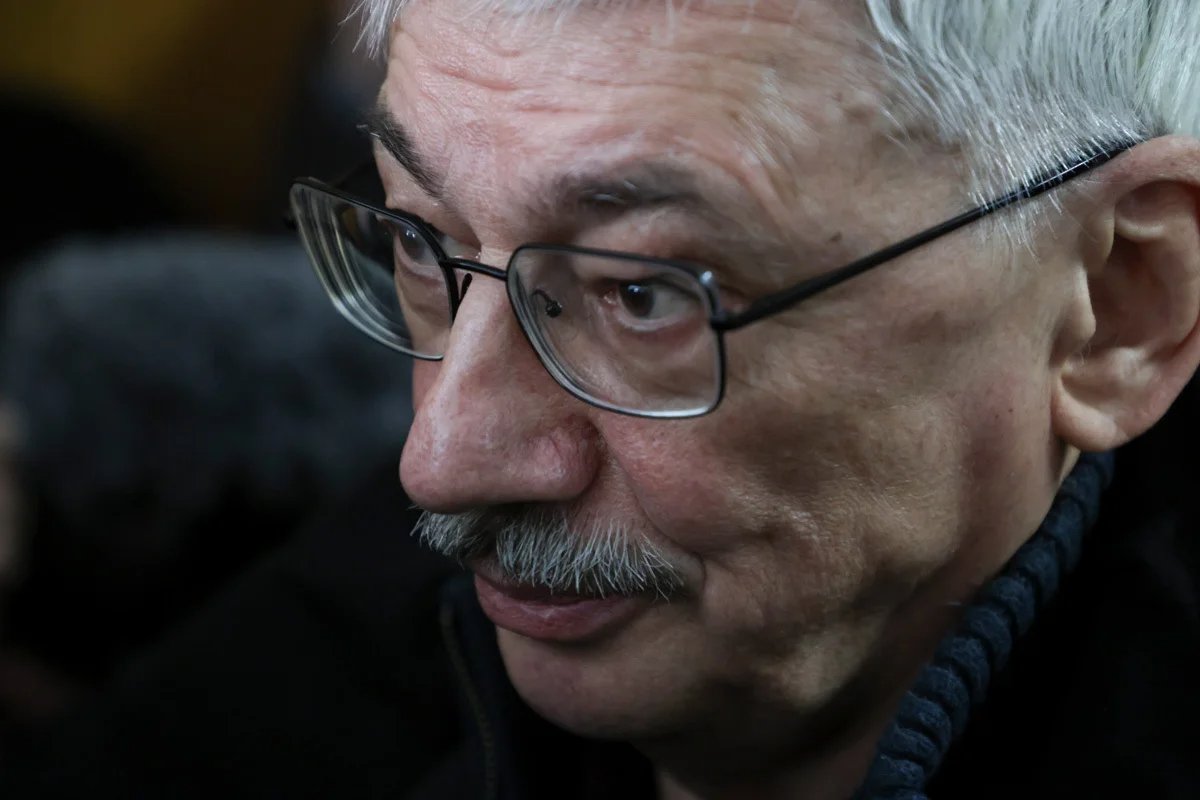
Oleg Orlov in court. Photo: Sergey Ilnitsky / EPA-EFE
Orlov wrote: “The bloody war unleashed by the Putin regime in Ukraine isn’t just the mass murder of the Ukrainian people and the destruction of the infrastructure, economy, and cultural property of this wonderful country. It isn’t just about the desecration of international law. The war also deals a very heavy blow to Russia’s future.”
When asked in court why he protested in the streets and wrote the Mediapart article, Orlov said:
“I hoped that I could somehow mitigate this impending disaster. If one has even the slightest hope of stopping evil, one should try to do just that.”
The first trial ended in a surprisingly lenient ruling by Russian standards, despite the prosecution requesting that Orlov be sent for a psychiatric evaluation due to his “heightened sense of justice, showing-off, and lack of self-preservation”.
Given another fine of 150,000 rubles (€1,500) and released, Orlov appeared to buck the trend seen in most “repeat discreditation” cases and avoided a prison sentence. He did not, however, manage to remain free for long.
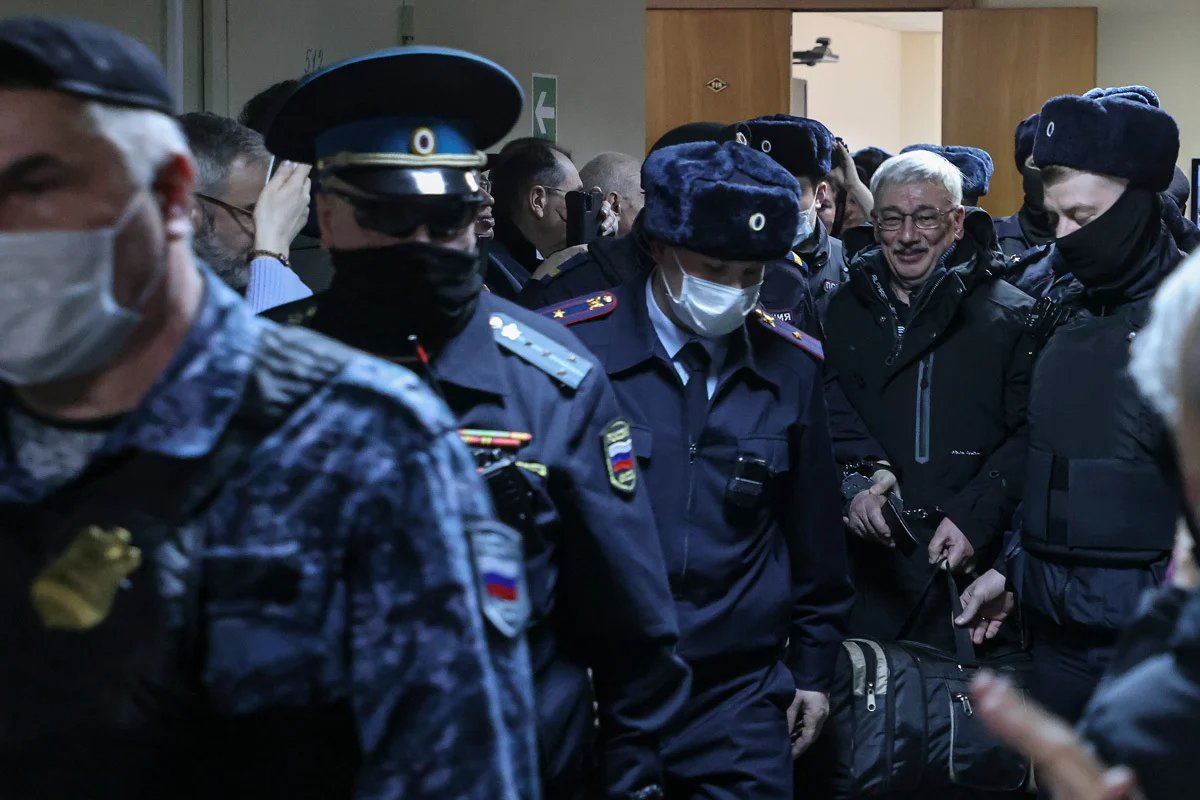
Oleg Orlov in court. Photo: Sergey Ilnitsky / EPA-EFE
Sham retrial
The prosecutor’s office immediately appealed the ruling, arguing that the court had ignored Orlov’s motives of “political and ideological hatred”. The Moscow City Court agreed with the appeal and sent the case for retrial to the same court, with a different judge presiding.
As Orlov had been branded a “foreign agent” shortly before his retrial, anyone testifying in his defence could now risk prosecution for being affiliated with a foreign agent. Orlov therefore banned his lawyers from calling witnesses and refused to allow his defence team to present his defence, choosing instead to read The Trial by Franz Kafka during the retrial in a gesture of defiance.
During breaks, Orlov explained to journalists that while he and his lawyers had diligently presented their evidence at the first trial, only for almost none of it to be mentioned in the verdict, this time he wouldn’t even take part in the charade. “Why humiliate yourself by casting pearls before swine?”
This time the court found that Orlov’s actions were aggravated by hatred towards “traditional Russian spiritual, moral, and patriotic values” as well as Russian servicemen, and sentenced him to 2.5 years behind bars in late February.
In his closing statement at the retrial, Orlov said: “Don’t give up. Do not lose heart, do not lose optimism. The truth is on our side. Those who have driven our country into this pit stand for the old, the decrepit, the obsolete. They have no notion of the future — only false images of the past and delusions of imperial grandeur”.
Torture as strategy
Orlov’s defence team is now appealing the ruling, which means that his sentence will not legally enter into force until the appeal hearing. Until last week, Orlov was being held in a Moscow pretrial detention centre, where despite his advanced age the authorities mockingly offered the Nobel laureate and outspoken war critic the chance to fight in Ukraine. Unsurprisingly, Orlov refused.
To prepare for the appeal hearing, Orlov sent a request to the judge to be introduced to the case files and the minutes of previous hearings — a right guaranteed to all convicted persons. But for him, the exercise of this right has been turned into torture.
For over two weeks, Orlov had been taken into court to be introduced to the case files and only brought back at night, Memorial wrote in early April, thus being deprived of hot food, rest, and confidential communication with his lawyer.
Orlov’s health had deteriorated over that period due to “inhumane treatment” by the prison authorities, Memorial noted, adding that he had partially lost his hearing.
After complaints from Orlov’s lawyer, the judge gave Orlov only until 5 April to acquaint himself with the case files, seemingly in a rush to advance the case to appeal with no actual regard for Orlov’s health, Memorial added.
Under current Russian law, one day in pretrial detention is equivalent to 1.5 days in a general regime prison. Some convicts, mostly in non-political cases, are given months to familiarise themselves with the case files before the appeal hearing, and nobody tries to prevent them from doing so. It’s clear that in Orlov’s case, the authorities are keen to deprive him of the chance to have his sentence reduced.
Political prisoners, on the other hand, are treated as hardened criminals in order to get the appeal process over with as soon as possible. Orlov’s treatment is a vivid example of this strategy.
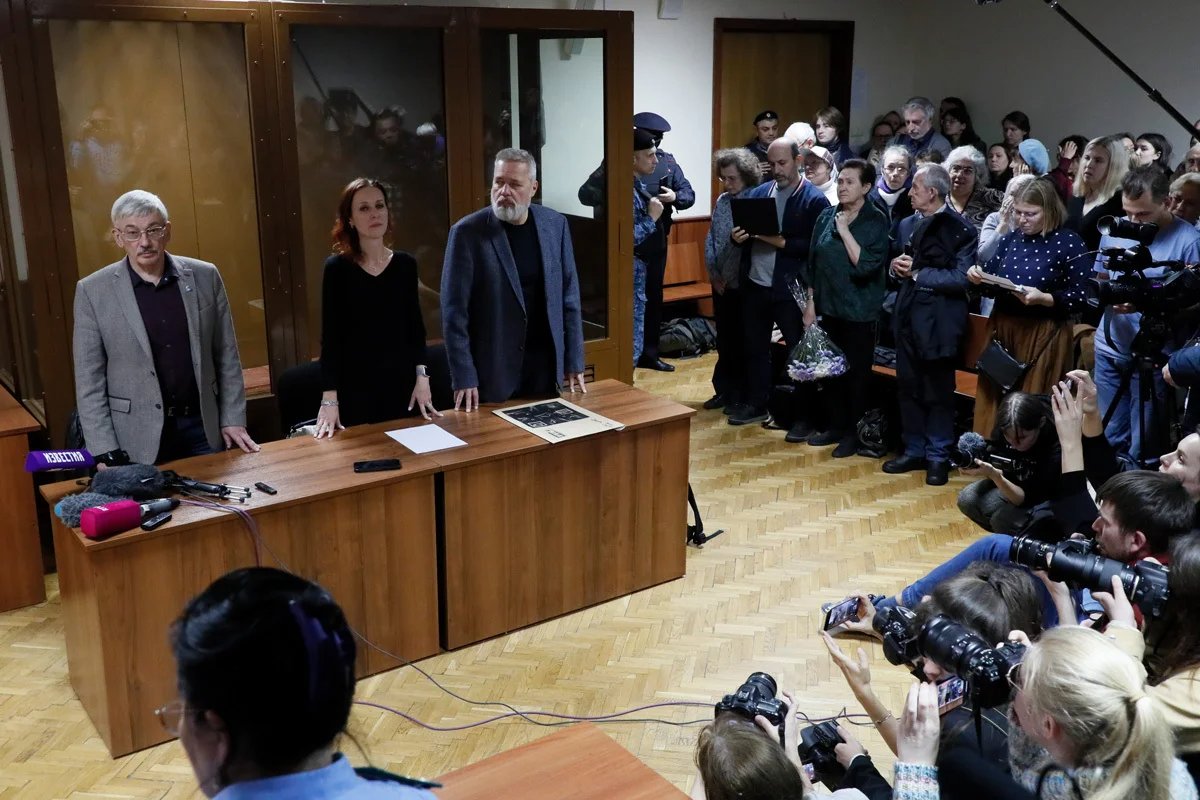
Oleg Orlov in court. Photo: Yury Kochetkov / EPA-EFE
Fresh hell
After the appeal, Orlov will likely be sent to a general regime colony, where prisoners typically perform manual labour such as making reinforced concrete or producing goods for the army. Orlov’s age would ordinarily disqualify him from working, but given that he was offered a chance to enlist, the prison authorities might also just ignore the existing rules on working in Orlov’s case as well.
“Orlov will likely be placed in a unit for prisoners who cannot perform labour due to age or disability,” a former inmate told Novaya Europe. He added that older prisoners spend all day in the barracks watching Russian propaganda, which, he said, “is torture in itself”.
Even watching TV in prison is better done without commenting on its content: Moscow deputy Alexey Gorinov and mathematician Azat Miftakhov were charged with “justifying terrorism” while already serving another sentence, denounced by other inmates who were watching TV with them and perceived their comments as extremist.
Orlov’s lawyers fear that he won’t have it easy in prison either. But their greatest concern is his health. Memorial reported that Orlov’s lawyer finally managed to meet him and have a private conversation on 8 April. Although he is feeling better, Orlov’s hearing has not fully recovered.
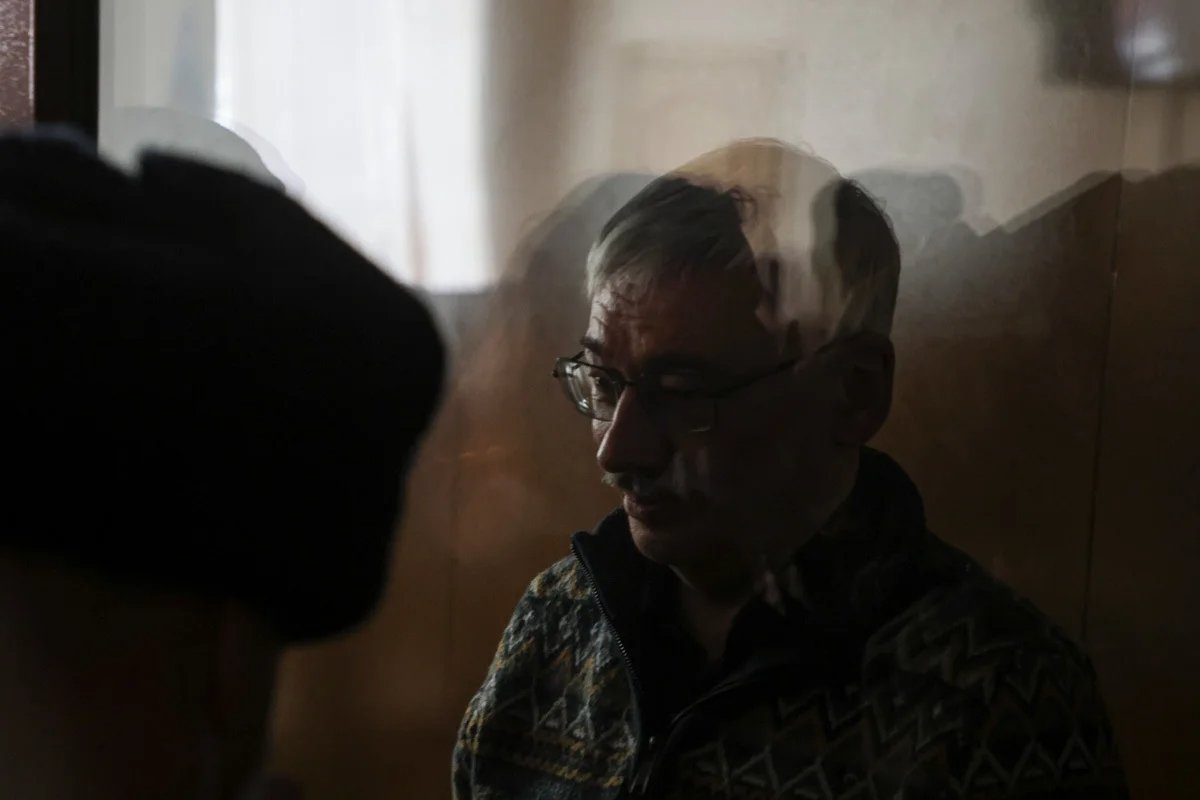
Oleg Orlov. Photo: Sergey Ilnitsky / EPA-EFE
Now that Orlov’s being unlawfully transferred to a different prison, monitoring his health and staying in contact with him will become even harder. “While Orlov is being transferred, he is deprived of normal food, medical care and any communication with his relatives,” lawyer Katerina Tertukhina told Memorial.
Another lawyer told Memorial that it was hard to interpret Orlov’s transfer as anything other than revenge, noting that the judge approved a meeting with Orlov’s wife to coincide with the day that he was transferred from the Moscow jail.
Orlov got in touch with Memorial from a pretrial detention centre in Samara, saying that he was “very tired” and that he did not know where he was being transferred or on what grounds.
The date for the appeal hearing, for which Orlov is likely to be transferred back to Moscow, has not been set yet. He is also currently appealing his “foreign agent” status, with the next hearing scheduled for 25 April.
Join us in rebuilding Novaya Gazeta Europe
The Russian government has banned independent media. We were forced to leave our country in order to keep doing our job, telling our readers about what is going on Russia, Ukraine and Europe.
We will continue fighting against warfare and dictatorship. We believe that freedom of speech is the most efficient antidote against tyranny. Support us financially to help us fight for peace and freedom.
By clicking the Support button, you agree to the processing of your personal data.
To cancel a regular donation, please write to [email protected]
